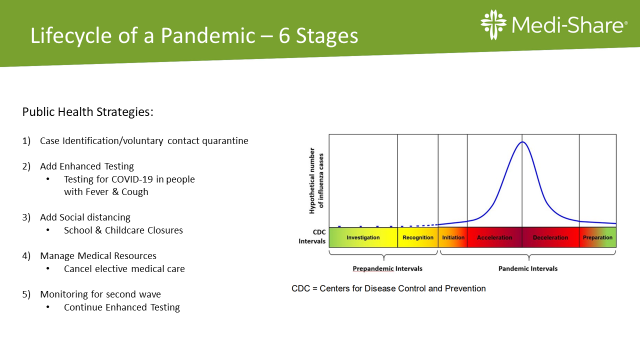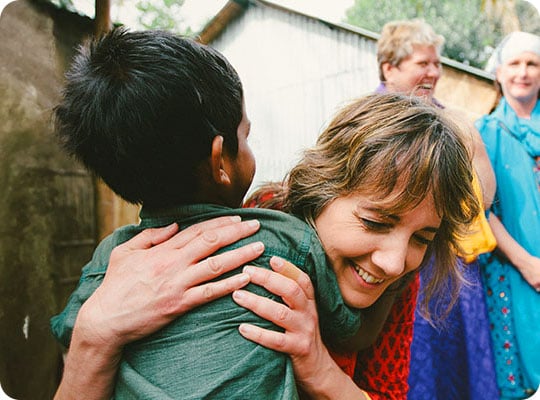The volume of information regarding COVID-19 released in the past week is overwhelming. The initial, simple message has increased in complexity with new tallies daily on how many are infected and what actions governments, educational institutions, hospitals, and businesses are taking to help control the spread of the infection.
What's a pandemic and what to expect
With no medications and/or vaccines currently available, the focus remains on personal hygiene, COVID-19 testing, and public health strategies.
But really…what is a “pandemic” and what can we expect over the upcoming weeks as the world responds to this infection?
A pandemic is defined when an infection has “efficient and sustained human to human transmission worldwide.” Some recent prior pandemics have included HIV/AIDS 2005, Hong Kong Flu pandemic 1968, and the Asian Flu pandemic of 1956.
There are phases to a pandemic with different public health strategies applied in each phase.

Where is America on "the curve?"
Currently, in the United States, we are experiencing the Acceleration phase, so you can expect rapid doubling of cases over the next days to weeks. How fast this occurs depends on how successful we are in applying the public health strategies.
Over the next week we will continue to see case identifications with isolation of those sick patients, enhanced testing for COVID-19 to help us to identify cases, plus the addition of more and more social distancing, which includes things like cancelling large public events, closing schools, etc.
The peak of the pandemic will see cancellation and postponement of elective medical care, including procedures like knee replacements, hysterectomies and routine physicals.
When you should get tested for COVID-19
Much has been highlighted in the news regarding COVID-19 testing and social distancing, but one important thing to note is that COVID-19 testing is recommended for only a small subset of people who:
Have a fever of 100.4 and cough/shortness of breath
AND
You have returned from international travel with the last 14 days, or
You have returned from a cruise within the last 14 days, or
You have been in close contact with someone who is sick with known Coronavirus.
As more tests become available testing volume will increase, but it is important to understand that these tests are primarily to help our public health and medical systems to understand the timing and aggressiveness of social distancing, and to manage medical resources.
For the short term, there are no proven antivirals or vaccines to treat this infection. Medical care will be focused on supportive treatment for those who develop breathing complications from the infection.
As a reminder, if you are concerned that you may have symptoms of fever, cough, or shortness of breath and are wondering if you should seek testing, the Medi-Share program offers free MDLive telehealth for its members, available 24/7. You can speak with a board certified physician who can help guide you on the best next steps to safeguard your health.
Medi-Share, like our nation, will continue to monitor the COVID-19 situation. We encourage our members and everyone to stay calm and to follow local public health recommendations regarding travel, avoiding work/school if sick, and implementing social distancing when directed in your area.
We are grateful to be a part of a faith community and are lifting our members, our staff, and our nation in prayer.











Comments